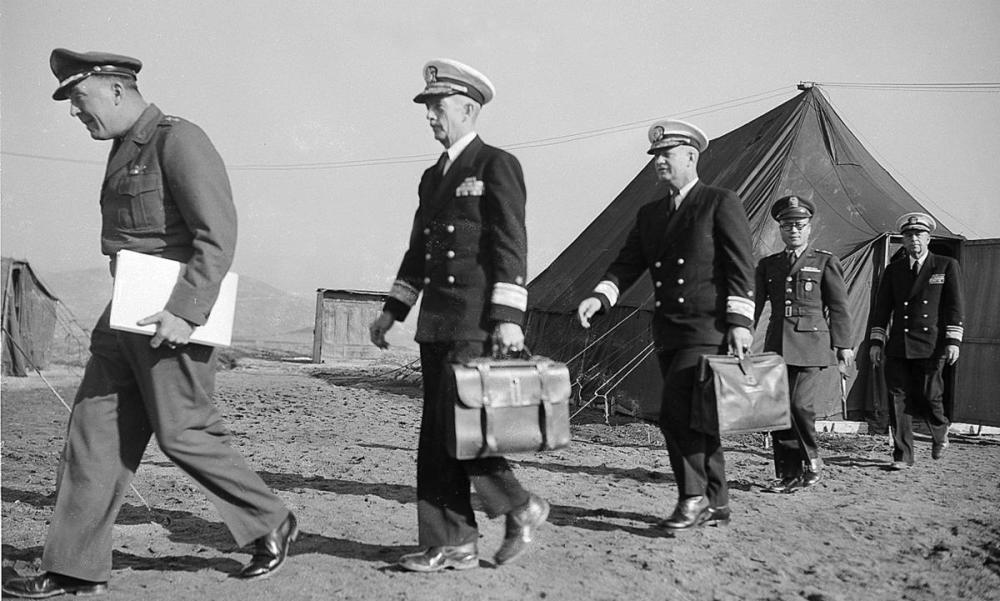What is history: it is the echo of the past to the future, the reflection of the future on the past. - Hugo
During the Panmunjom negotiations, the chief representatives of the DPRK-China side were General Nam Il, chief of the general staff of the Korean People's Army, and the other representatives were: General Lee Sang-chao, chief of staff of the Korean People's Army Forward Command, General Deng Hua, deputy commander of the Chinese People's Volunteer Army, General Xie Fang, chief of staff of the Chinese People's Volunteer Army, and General Jang Pyeong-san, chief of staff of the First Army of the Korean People's Army. The chief representatives of the United Nations forces were Lieutenant General Turner Joey, Commander of the Far East Navy, and the other representatives were: Rear Admiral Krech, Deputy Commander of the United States Far East Air Force, Major General Hank, Chief of Staff of the United States Eighth Army, Major General Boke, Commander of the United States Cruiser Detachment, and Paik Sun-yeol, Commander of the First Army of the Republic of Korea.
Representatives of the United Nations forces during the negotiations, one from the left, is Lieutenant General Turner Joai

This Bai Sunye is not simple, he has been in the South Korean army all the way, division commander, army commander, army staff chief, army general, known as the first general of Korea.
Bai Shanye in 1953
As a witness to the Panmunjom negotiations, Bai Shanye recalled some rare details, different positions, different feelings, look at a few paragraphs:
1. Smoking
General Nanri, the chief representative of the North Korean side in the Panmunjom negotiations
There were three people who attended the negotiations as the north Korean armistice negotiators, namely chief representatives Nam Il, Lee Sang-chao, and Jang Ping-san. The three have always had a relatively blunt attitude. I thought it might have been deliberate, but all three of them looked fierce and evil. Nam Il, like a person from the average Hamgyong Province, is less reticent. He smoked one cigarette after another. After he severely criticized the United Nations side, he smoked one cigarette after another. Admiral Turner Joy also began smoking cigarette after cigarette. Except for talking time, he still kept smoking. The negotiation scene was often choked by the smoke spit out by the two men.
2. Slip of paper
The Representatives of China and the DPRK in the Panmunjom negotiations started from left with Xie Fang, Deng Hua, Nan Ri, Li Xiangchao, and Zhang Pingshan
The representatives of the DPRK side all had a blunt and vicious expression on their faces, which made the whole negotiation very boring... I remember that one day, our chief negotiator, Admiral Joy, made his final speech, and when he asked "is there nothing to say?" the negotiation site fell into a temporary silence. At that time, Li Xiang was rustling and writing something on the paper, and then suddenly picked up the paper and showed it to me, and it said, "The lackeys of imperialism are not even as good as the dogs that have lost their families." I was enraged and thought, "These people, now officially start psychological warfare."
Later, I heard that he felt that I, the expressionless and always silent representative of the South Korean National Army, were very confused.
3. Smile
Also as communists, the representatives of the Chinese army are a little different.
Pictured: Volunteer army representatives Deng Hua (left), Xie Fang (right), Li Kenong (front), Qiao Guanhua (back middle)
We often see less vocal styles in Chinese. Expressions of inner thoughts, likes and dislikes or dislikes are very rare. Instead, they often smile. We rarely see the kind of broken face laugh that breaks the expression and laughs out loud, but often has a slight smile on the face. If you give it a name, it can be called a Chinese smile.
Deng Hua and Nan Ri during the negotiations
The representatives of the Chinese army at the armistice negotiating table belong to such people. They are not the style of peering at each other and engaging in momentum battles with an angry expression. Instead, they smile quietly and turn their minds quickly.
In the armistice negotiations, the Chinese military representatives were more flexible than the Representatives of the Korean Army. They are always smiling, good at conducting highly psychological warfare, and are very experienced opponents.